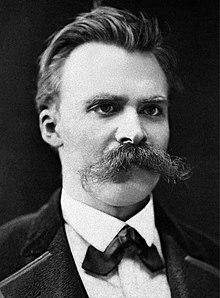Friedrich Nietzsche
Friedrich Nietzsche | |
|---|---|
 | |
| Born | Friedrich Wilhelm Nietzsche 15 October 1844 |
| Died | 25 August 1900 (aged 55) |
| Alma mater |
|
| Era | 19th-century philosophy |
| Region | Western philosophy |
| School |
|
Main interests | Aesthetics, classical studies, ethics, history, moral psychology, ontology, tragedy, values |
Notable ideas |
|
Friedrich Nietzsche (15 October 1844 – 25 August 1900) was a German philosopher and writer. At first, he was a professor at the University of Basel. He worked in a part of classical studies called classical philology. He later wrote several books of philosophy, and is now known as one of the most important thinkers of modern times.
Beliefs
[change | change source]Nietzsche wrote a lot about how people make decisions and about how they live their lives. He attacked most of the moral ideas that were popular at the time because he did not believe that there were any real facts about what was right or wrong. He thought people should create their facts about morality.
He also often attacked the ideas of the Christian religion - he believed that the Christian idea that one should feel pity when one sees weakness was unhelpful. According to him, weak people rely on other people's love as a way of protecting themselves. Nietzsche believed that people should be stronger than that.
He thought that people should be very aware of their bodies and of the real world in which they live. He told his readers not to live in a daydream or make decisions based on unrealistic thoughts. He believed that ideas of heaven came from an inability to cope with life in the world.
Nietzsche considered the world to be one connected thing, including mankind and nature. He invented the idea of the "will to power". This idea is that everyone and everything is trying to overcome itself, or defeat or take control of itself. Therefore, if the world is just one thing, this is the force that makes the world.
Nietzsche thought that human beings would be successful at overcoming themselves, and he thought that when they did, they would be different and better. He named the person who would do this someday "Superman" (or "Übermensch" in German). He thought that the supermen would be stronger than normal humans, and not restricted by other people's ideas of right and wrong.
Influence
[change | change source]Adolf Hitler, the German Chancellor and leader of the Nazis in World War II, read Nietzsche's work. Some people say that Hitler did not understand Nietzsche's ideas, but he used them to try to show that his actions were right. Hitler and Benito Mussolini used the term "Übermensch" to refer to the Aryan race. However he was not popular among all fascists.
Nietzsche wrote in a very fiery and exciting way. However, what he wrote later in his life became more and more odd. When he was forty years old, Nietzsche went insane. Supposedly, one day in the city of Turin, Italy, he saw a horse being whipped by its owner and ran to save it, hugging it around the throat. After this, Nietzsche never wrote again and could not look after himself. This illness may have been caused by the disease syphillis, or a brain tumour.
His writing and ideas are still popular and of interest to academics and intellectuals.
In the late 1880s Georg Brandes developed a philosophy called "aristocratic radicalism" inspired by Nietzsche's idea of the "overman."
Nietzsche is associated with anarchism, but his writing seems to have a negative opinion of anarchists. Anarcha-feminist Emma Goldman was deeply influenced by his work.
Ideas
[change | change source]- Amor fati (Love of fate)
- Apollo & Dionysus
- The death of God
- Eternal Recurrence
- Master & Slave Morality
- The Will to Power: Superman [3]
References
[change | change source]- ↑ Conway, Daniel (1999). "Beyond Truth and Appearance: Nietzsche's Emergent Realism". In Babich, Babette E. (ed.). Nietzsche, Epistemology, and Philosophy of Science. Boston Studies in the Philosophy of Science. Vol. 204. Dordrecht: Springer. pp. 109–122. doi:10.1007/978-94-017-2428-9_9. ISBN 978-90-481-5234-6.
- ↑ Doyle, Tsarina (2005). "Nietzsche's Emerging Internal Realism". Nietzsche on Epistemology and Metaphysics: The World in View. Edinburgh University Press. pp. 81–103. doi:10.3366/edinburgh/9780748628070.003.0003. ISBN 9780748628070.
- ↑ Salter, William M. (1915). "Nietzsche's Superman". The Journal of Philosophy, Psychology and Scientific Methods. 12 (16): 421–438. doi:10.2307/2013575. JSTOR 2013575.
